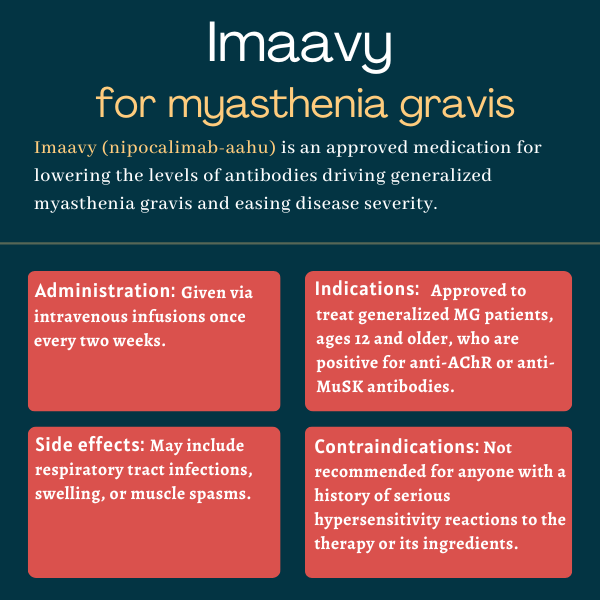Imaavy (nipocalimab-aahu) for myasthenia gravis
Last updated May 2, 2025, by Lindsey Shapiro, PhD

What is Imaavy for myasthenia gravis?
Imaavy (nipocalimab-aahu) is an antibody therapy approved in the U.S. for adults and adolescents with generalized myasthenia gravis (gMG) who are positive for antibodies against the acetylcholine receptor (AChR) or muscle-specific kinase (MuSK) proteins, the two most common types of MG-causing antibodies.
The therapy aims to lower the levels of the self-reactive antibodies that impair nerve-muscle communication in myasthenia gravis (MG) by blocking the neonatal Fc receptor (FcRn), a protein that normally would prevent these antibodies and others in their class from being broken down.
In doing so, Imaavy helps accelerate the destruction of these harmful self-reactive antibodies, thus easing MG symptoms and reducing overall disease severity.
The therapy, developed by Johnson & Johnson, is given via infusions into the bloodstream, or intravenously. Imaavy is the only FcRn blocker currently approved for both adult and pediatric gMG patients with either AChR- or MuSK-targeted antibodies. It’s also being developed for various other autoimmune conditions.
Therapy snapshot
| Brand name: | Imaavy |
| Chemical name: | Nipocalimab-aahu |
| Usage: | Used to lower the levels of antibodies driving generalized myasthenia gravis and ease disease severity |
| Administration: | Intravenous infusion |
Who can take Imaavy?
Imaavy is approved in the U.S. for adult and pediatric patients, ages 12 and older, who are positive for anti-AChR or anti-MuSK antibodies.
It is contraindicated for patients with a history of serious hypersensitivity reactions to nipocalimab or any of its ingredients, including serious and potentially life-threatening allergic reactions (anaphylaxis) or angioedema (swelling under the skin).
The administration of Imaavy should also be delayed in patients with an active infection.
How is Imaavy administered?
Imaavy is administered by a healthcare provider via intravenous infusions given once every two weeks. The first infusion, given at a recommended dose of 30 mg/kg of body weight, will take at least 30 minutes. Subsequent infusions will take at least 15 minutes and be given at a dose of 15 mg/kg. Patients should be monitored for 30 minutes after each infusion to make sure no infusion-related or hypersensitivity reactions occur.
Patients may also have to receive age-appropriate vaccines before starting treatment, because live vaccines shouldn’t be given during treatment with Imaavy.

Imaavy in clinical trials
Imaavy’s approval in the U.S. was backed by findings from a Phase 3 clinical trial involving adults and a Phase 2/3 study enrolling children and adolescents with gMG who haven’t responded adequately to standard therapies. Both studies demonstrated that Imaavy was able to lower the levels of MG-causing antibodies and ease disease severity.
- Vivacity-MG3 (NCT04951622), where Imaavy given on top of standard-of-care treatment led to significant reductions in disease severity and lowered the levels of self-reactive antibodies after six months compared with a placebo in adults with gMG, particularly those who were positive for disease-causing antibodies. Data from its open-label extension also showed these benefits were sustained long-term.
- Vibrance-MG (NCT05265273), where Imaavy was safe and had similar benefits in a small group of adolescents with gMG, ages 12-17, who had anti-AChR antibodies. As in adults, the treatment lowered self-reactive antibody levels and eased disease severity after six months compared with the start of the trial.
The findings from these studies were generally similar to observations made in a previous Phase 2 study called Vivacity-MG (NCT03772587), which also involved adult gMG patients with an inadequate response to standard care.
Common side effects of Imaavy
The most common side effects of Imaavy in people with gMG include:
- respiratory tract infections
- swelling in the hands, legs, or feet
- muscle spasms.
Other possible serious side effects that can occur with Imaavy include:
- new infections or reactivation of previous ones
- hypersensitivity reactions, including angioedema, anaphylaxis, rash, hives, or dry and inflamed skin (eczema)
- infusion-related reactions, including headache, flu-like illness, rash, nausea, fatigue, dizziness, chills, or skin redness.
Because Imaavy can also lower the levels of antibodies that normally help defend the body against harmful invaders, patients should be carefully monitored for signs of any type of infection, including:
- fever
- chills
- cough
- sore throat
- fever blisters
- burning during urination.
If a serious infection develops, appropriate treatment should be given and treatment with Imaavy may have to be delayed until it resolves.
Patients should also be monitored during and after each infusion for hypersensitivity or infusion-related reactions. If they occur, infusions may be paused, stopped, or adjusted. Patients should seek emergency medical help if they experience symptoms of a severe allergic reaction, including:
- swelling of the face, lips, or mouth
- difficulty swallowing or breathing
- hives
- chest pain and tightness.
People using other medications that bind to FcRn need to be closely monitored to make sure those medications don’t become less effective. If they do, a doctor might consider stopping Imaavy, so patients should always let their doctors know about any other medications they use.
Myasthenia Gravis News is strictly a news and information website about the disease. It does not provide medical advice, diagnosis, or treatment. This content is not intended to be a substitute for professional medical advice, diagnosis, or treatment. Always seek the advice of your physician or other qualified health provider with any questions you may have regarding a medical condition. Never disregard professional medical advice or delay in seeking it because of something you have read on this website.
Recent Posts
- Working through myasthenia gravis, one story at a time
- Azathioprine eases MG symptoms, but does not extend survival: Study
- How studying history can help us navigate life with chronic illness
- Povetacicept reduces disease activity in MG mouse model
- The tug-of-war between my independence and his caregiving






